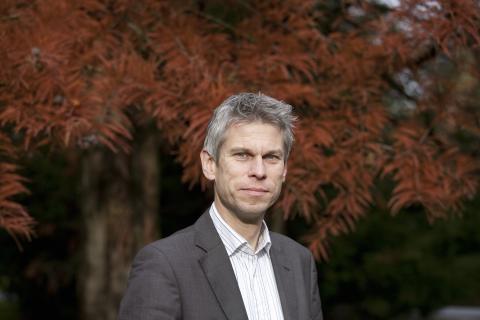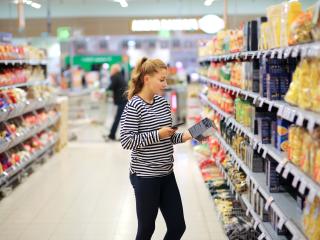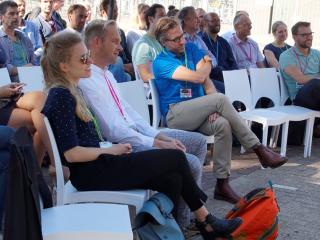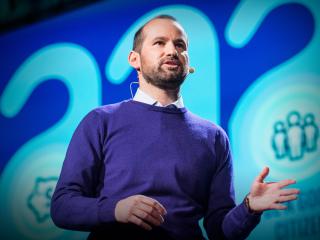If agriculture does not change, we will never meet the climate targets
“With legislation, politicians must steer the agricultural sector, otherwise we will never achieve the climate targets,” says Prof. Jonathan Verschuuren. With his research, he tries to contribute to more sustainable production and consumption, the twelfth UN Sustainable Development Goal. “The livestock population must be reduced and agriculture less intensive. Only then can CO2, methane, and nitrous oxide emissions be reduced. It's not enough if, like me, everyone in the Netherlands stops eating meat. The emission of greenhouse gases and thus the climate is a global problem.”
Verschuuren is a full professor at Tilburg Law School at Tilburg University. While writing the Research Handbook on Climate Change Adaptation Law, he discovered that there was only one specialist in the scientific world dealing with agriculture and climate law. That is why he decided to specialize in this area, as a lot has to change in the coming years. “Food production is under pressure due to climate change and decreasing global agricultural area while food demand is expected to increase by 40 to 60 percent over the next 30 years.” The ever-increasing consumption of meat is the main challenge in reducing greenhouse gas emissions. The agricultural sector accounts for a quarter of global emissions, among other things, through deforestation to create additional farmland.
Climate targets
For a number of years now, Verschuuren has been conducting research into how the Paris 2015 climate targets can be achieved. With the European Marie Curie Fellowship and NWO money, he is exploring how the European emissions trading system can be adapted to reduce greenhouse gas emissions from agriculture and increase the carbon uptake of agricultural land. Both contribute greatly to stopping global warming. Among other things, he examines how Australia, the US, and China are tackling this problem. “In China and the US, agriculture is part of the emissions trading system. The problem in the EU is that emissions from agriculture are barely regulated, whereas this is necessary if we are to be climate-neutral by 2050.”
Taking big steps
In order to be able to take big steps, regulation is needed. “Climate is part of the EU's Common Agriculture Policy, but there are few truly binding commitments. Farmers, for example, are free to apply for subsidies to reduce their emissions, but there is no pressure; there is even subsidy left over. And then in the Netherlands, it is also quite easy to get agricultural subsidies for projects with no or only slight improvement of the climate.” Verschuuren advises the EU to compensate farmers who start farming less intensively.
CO2 sequestration in farmland
In Australia, he saw how farmers voluntarily started to work differently. “Farmers do their best to let the soil absorb more CO2 by farming less intensively. As a result, more and a greater variety of crops grow around the fields, and more insects and birds live there. In addition, the soil retains water better and is therefore less vulnerable to drought. The yield of these areas initially decreases, but, after a number of years, the yield rises again. CO2 sequestration with agricultural land should also become a new product for farmers in Europe. They can make money with this, for example, by selling the emission space they have created to other sectors or to the government.”
Higher taxes on meat
Also for the consumer, the demand side, the government must draw up rules, according to Verschuuren. Meat consumption is growing, making it difficult to meet climate targets. Reducing it is necessary. This requires a change in consumer behavior. “Increasing taxation on meat and reducing taxation on meat substitutes could be effective, but the EU does not have this power. The EU can try to persuade member states to do this.”
Because an adaptation of the eating behavior of consumers is necessary, the professor advocates multidisciplinary research. “Behavioral scientists can provide insight into how consumers think and what it takes to make them eat differently. I find it interesting to investigate which legal and non-legal instruments can be used together on a global scale.” In his own studies, Verschuuren looks at both mitigation, i.e., reducing greenhouse gas emissions through legal measures, and adaptation: adapting society to a changing climate with more drought, higher temperatures, and more storms. The latter can be done, for example, by working on buildings, infrastructure, agriculture, and the fishing industry.
Jonathan Verschuuren

Professor Jonathan Verschuuren holds the chair of International and European Environmental Law at Tilburg University. He has been working at this university since 1999 and was, among other things, Vice-Dean for Research at Tilburg Law School. Since his research sabbatical that followed this administrative position in 2011, the focus of his research has been entirely on climate change. “Climate change is a major topic of great relevance now and in the decades to come. So it's good to build up expertise in this area.”
Date of publication: 4 February 2020



